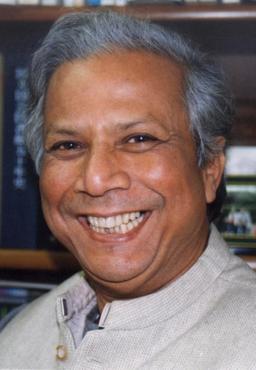Dr. Mohammad Yunus Lecture
Dr. Mohammad Yunus
Recipient, 2006 Nobel Peace Prize
will be addressing the
Vancouver Institute on
Friday, March 14, 2008 at
8:00 p.m.,
Chan Centre for the Performing Arts, University of British Columbia.
NB: Alternate day of the week.
NB: Alternate time.
NB: Alternate location.
Michael Smith Memorial Nobel Lecture
(No bio. The webmaster has been advised that
"the reason there is no text is that this is a UBC lecture
to which we are attached."
Please see "Background" below.)
Special note regarding locations
There are no further tickets for Professor Yunus' lecture at the Chan
Centre available to the general public, but there are two ways that
Institute members will be able to see and hear his talk:
-
We will be showing a live webcast of his talk in Lecture Hall
No. 2 in the Woodward Instructional Resources Centre.
N.B. Since it's live, it will be the day and
time noted above rather than the Institute's usual day and time.
-
The Vancouver Institute has been given 300 tickets to the talk
at the Chan. Since The Institute has more than 300 members,
we will hold three separate lottery draws of 100 tickets each on:
-
Saturday, February 23, after the talk by Professor Brook,
-
Saturday, March 1, after the talk by Dr. Suzuki, and
-
Saturday, March 8, after the talk by Professor Akerlof.
Lottery tickets will be provided for free to all registered
members only of the Institute and, if your ticket is drawn,
you will receive one ticket to the event at the Chan if you
are a student or single member, and two tickets if you hold a
family membership.
NOTE: If you are not currently a member, you may join
immediately (i.e. right after Professor Brook's talk)
and be eligible for this draw.
Entries not drawn February 23 will be eligible for the two
subsequent draws.
Background Information
(These references were compiled by
the webmaster in the hope that they will prove interesting to some readers.
The web being what it is, some of them will have vanished by the time
you go to look them up, and there is—of course—no guarantee
of their accuracy.)
-
UBC Centenary
-
Professor Muhammad Yunus, recipient of the 2006 Nobel Prize for
Economics will deliver the first annual Michael Smith Memorial
Nobel Lecture, created in honour of UBC’s Nobel Prize winning
chemist, Dr. Michael Smith
[UBC's announcement of this lecture as part of its
Centenary celebrations.]
-
UBC Centenary
-
UBC will confer upon Professor Muhammad Yunus an Honorary
Degree, followed by a Colloquium on Social Corporate
Responsibility. Professor Yunus will speak shortly in acceptance
of his degree. ...
[Another event, earlier the same day.]
-
Muhammad Yunus . org - Home
-
Business Week Has Named Dr. Yunus as One of "The Greatest
Entrepreneurs of All Time"
Prof. Muhammad Yunus, the 2006 Nobel Peace Prize winner,
founded a banking system 30 years ago to lend small amounts of
money to the rural poor in Bangladeshi villages. Most of the
low-interest microloans go to women, who use them to start their
own profit-making enterprises, mainly in agriculture, crafts,
or services. ...
-
Wikipedia entry
-
Muhammad Yunus (Bengali: মুহাম্মদ ইউনুস, pronounced
Muhammôd Iunus) (born June 28, 1940) is a Bangladeshi banker and
economist. A former professor of economics, he is famous for his
successful application of the concept of microcredit, the
extension of small loans to entrepreneurs too poor to qualify
for traditional bank loans. Yunus is also the founder of Grameen
Bank. In 2006, Yunus and the bank were jointly awarded the Nobel
Peace Prize, "for their efforts to create economic and social
development from below."[1] Yunus himself has received several
other national and international honors. ...
-
Grameen - Banking for the poor
-
Prof. Muhammad Yunus & Grameen Bank Awarded The Nobel
Peace Prize for 2006
The Norwegian Nobel Committee has decided to award the Nobel
Peace Prize for 2006, divided into two equal parts, to Muhammad
Yunus and Grameen Bank for their efforts to create economic and
social development from below. Lasting peace can not be achieved
unless large population groups find ways in which to break out
of poverty. Micro-credit is one such means. Development from
below also serves to advance democracy and human rights...

